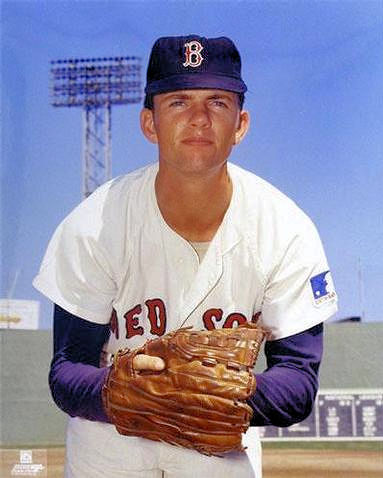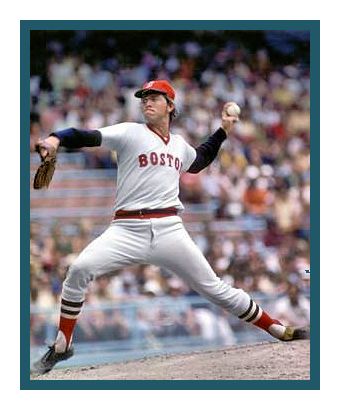|
“FENWAY'S BEST PLAYERS”  |
|||||
Bill Lee was one of those rare ballplayers whose off-field persona overshadowed his significant on-field performance. He was an original in a sport that often frowns on any show of originality. His often outrageous statements and bizarre actions marked him as an oddity and ensured him a lasting reputation in the button-down baseball world. They also earned him the nickname "Spaceman," a title he never fully embraced, arguing that his first priority was always Mother Earth. Nevertheless, Lee's record speaks for itself and places him in the company of some of the best pitchers in Red Sox history. He won hardcore baseball fans over with his solid work ethic while on the mound. Lee was selected by the Red Sox in the 22nd round of the 1968 free-agent draft and was assigned to Waterloo of the Midwest League and then to Winston-Salem of the Carolina League. He began the 1969 season with Pittsfield, and by late June, he was brought up to the Red Sox. Lee's debut came in a relief appearance in June 1969, in the second game of a Fenway doubleheader against Cleveland. Early on, Lee started feeding zingers to the press. When he first came up and was given a tour of Fenway Park, he stared wide-eyed at the Green Monster and inquired, "Do they leave it there during the games?" Before too long Lee became the darling of the dailies. Over the years, reporters came to know that regardless of the on-field prospects of the Sox, he could provide them with lots of colorful copy and he rarely disappointed. He always seemed good for an original quote. In 1970, his best game was a 2-1 win over Oakland in April at Fenway. In 1971, he posted an excellent 2.74 ERA with a 9-2 won-loss record. In 1972, Lee did not start a game, again appearing 47 times and helping keep the Sox in the hunt right up to the final day when the team fell just a half-game short of capturing the pennant. He also hit his only American League home run on the night of September 11th in Cleveland Stadium. 1973 was Bill Lee's breakout year. After four quality long-relief stints in April and after several Red Sox starters struggled, he got his first start on May 1st, and never left the rotation. He won 17 while losing 11. Only Luis Tiant won more but Lee led the team's starters in ERA with a stellar 2.75. Lee was honored by being named to the American League All-Star squad but did not appear in the game itself. In 1973, Carlton Fisk became the team's player representative, with Lee as the alternate. Both men arrived on the scene immediately willing to speak out for themselves and their teammates. This marked the start of a strong relationship between Fisk and Lee. The young take-charge catcher would often come out to the mound and get in Lee's face to get him to focus, or throw the right pitch. It was a very successful partnership for several years. Lee won 17 games again in 1974, still the #2 man on the mound, behind 22-game winner Luis Tiant. The Sox finished the season seven games out of first place, behind the pennant-winning Orioles. Then came 1975. For the third year in a row, Lee won 17 games, providing the team with an effective front three: Rick Wise won 19 and Tiant won 18. Lee remained a workhorse, tying for the team lead, throwing 260 innings. He did not appear in the ALCS, but started Game #2 of the 1975 World Series, and held Cincinnati's Big Red Machine to just five hits and two runs over eight-plus innings. The day after Bernie Carbo and Carlton Fisk hit Game Six homers to keep the Series alive, Lee started Game Seven of the World Series. He pitched 6 1/3 innings, shutting out the Reds through five until he gave up a prodigious two-run homer to Tony Perez on an ill-advised blooper pitch that Lee claims today "is still rising." 1976 was a disaster for Lee and the Red Sox. On May 20th, Lee was trailing 1-0 to the Yankees at the Stadium when Lou Piniella and Graig Nettles struck for back-to-back singles. Dwight Evans fielded the ball, eyed Piniella trying to score, and threw him out by a mile. But a melee ensued at the plate, and Lee was blindsided by Nettles and fell awkwardly on his shoulder. The Sox won that game but at a great cost to their playoff hopes. Lee left the game crippled, unable to appear in another game until July and never really fully got back on track. The following year, 1977, he was used sparingly, and in 1978, things seemed to turn around. Lee won his first four games and was 10-3 in early July. A founding member of a Red Sox faction known as the "Buffalo Heads", the purpose of which seemed to be making Sox manager Don Zimmer's life miserable, Lee famously referred to Zimmer as "the gerbil" and openly questioned many of the strategic moves made by the beleaguered manager. In July and August, he seemed to fall apart, losing seven straight decisions and found himself in the doghouse for the rest of the season. Zimmer's refusal to start Lee against the Yankees in September was a huge subplot in the collapse of the Red Sox. He appeared in two of the "Boston Massacre" games, but both times it was in relief. In the September 8th game, he threw seven innings in relief, allowing the Yankees just one earned run in a game New York won 13-2. On September 10th, his last appearance of the season, he closed out the game with 2 1/3 innings of scoreless relief, but the Yankees won nonetheless, 7-4. One more win at any point along the way and the Red Sox never would have had to play New York in the infamous single-game playoff, Before the year was out, Lee was sent packing. In December he was traded to the Montreal Expos for Stan Papi. When the trade was announced, Lee covered his disappointment with bravado, saying of the 1978 team, "Who wants to be with a team that will go down in history alongside the '64 Phillies and the '67 Arabs?" Lee left the majors for good in 1982 and claims that he has been blackballed from major league baseball ever since. The years following his departure from the majors have been nomadic, ranging from independent baseball to senior league games both north and south of the border. He still plays baseball and shows little sign of slowing down. Since leaving the major leagues, he has been an effective, if somewhat unorthodox, ambassador for the game in such places as Cuba, China, the former Soviet Union, and small-towns in Canada.
|
|||||

